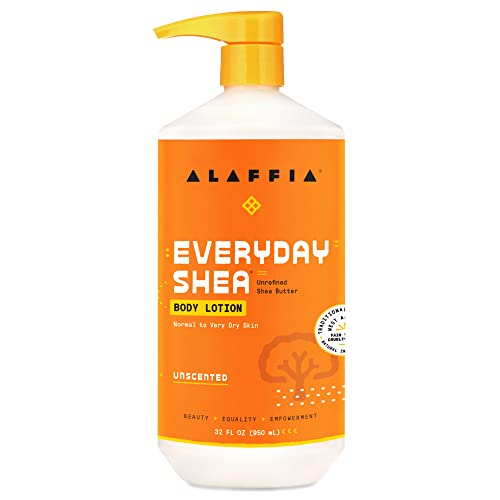
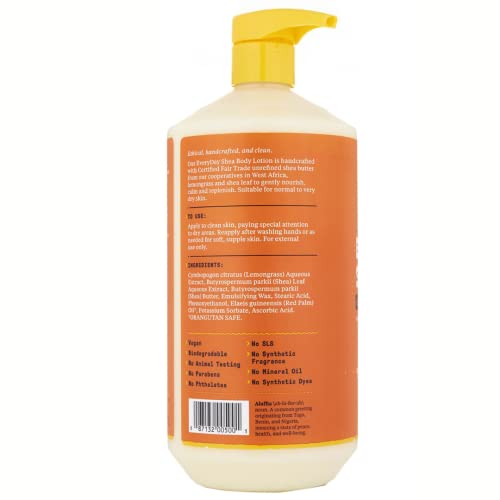
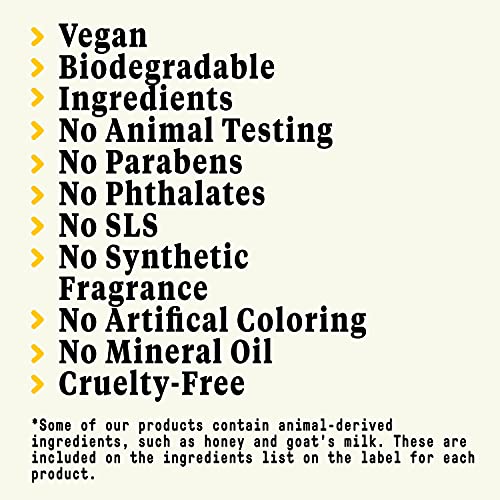

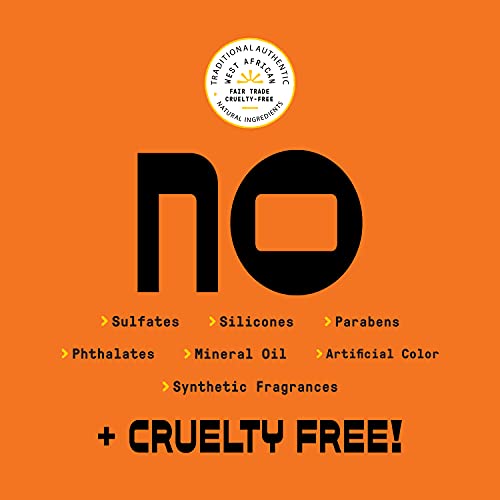
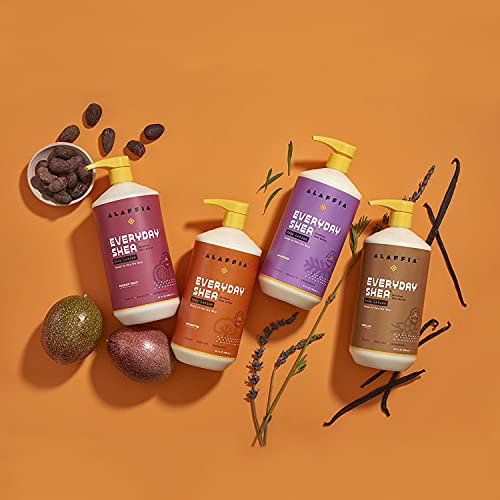
Alaffia EveryDay Shea Body Lotion - Deeply Moisturizing, Fair Trade Raw Shea Butter - 32 Fl Oz


Emulsifying Wax
Medium RiskEmulsifying wax is a mixture derived from plant and synthetic sources, primarily used to stabilize emulsions in cosmetic and personal care products. Its primary function is to blend oil and water-based ingredients, ensuring a uniform consistency and enhancing product texture.
Sustai Insights
Emulsifying wax offers functional benefits as an effective emulsifier, helping to create stable formulations in cosmetic products. It generally poses low health risks, with minimal concerns regarding carcinogenicity and allergenic potential. Environmental risks are also low, with no significant pollutant or bioaccumulation issues. However, use restrictions exist, and irritation potential is noted for sensitive skin. Regulatory assessments indicate it is safe for use within established concentration limits, leading to an overall moderate risk assessment. Alternatives like plant-based emulsifiers may offer sustainable options.
Phenoxyethanol
Medium RiskPhenoxyethanol is a preservative used in cosmetics and personal care products to prevent microbial growth and extend shelf life. It is commonly found in formulations such as lotions, creams, and serums.
Sustai Insights
Phenoxyethanol serves effectively as a preservative, ensuring product stability and safety by inhibiting microbial growth. It is considered to have low health risks regarding carcinogenicity, allergies, and reproductive toxicity. However, moderate use restrictions exist, and regulatory bodies have advised caution in specific applications. Environmental concerns include its potential as a pollutant, although it is not highly bioaccumulative. Overall, the ingredient presents a medium risk level, with safe usage practices recommended and alternative preservatives available for those seeking greener options.
Potassium Sorbate
Medium RiskPotassium sorbate is a potassium salt of sorbic acid, primarily used as a preservative in food and cosmetic products. It inhibits the growth of molds, yeast, and some bacteria, extending the shelf life of products. It is commonly found in various formulations due to its effectiveness and low toxicity.
Sustai Insights
Potassium sorbate serves as an effective preservative, preventing microbial growth in food and cosmetic products, which is vital for safety and longevity. Although it has a low risk of carcinogenicity and developmental toxicity, there is a moderate concern regarding allergies and immunotoxicity. Environmentally, it poses minimal risks as it is not significantly bioaccumulative. Regulatory agencies have verified its use, although some products may face restrictions. Overall, it is assessed as a medium risk ingredient, with safe usage practices recommended, and alternatives such as natural preservatives could be considered.
Stearic Acid
Low RiskStearic acid is a naturally occurring fatty acid commonly found in animal and vegetable fats. It functions primarily as an emulsifier, thickener, and stabilizer in cosmetic and personal care products, providing texture and consistency.
Sustai Insights
Stearic acid offers functional benefits such as effective emulsification and stabilization of formulations. It is derived from renewable sources and is biodegradable, contributing to its sustainability profile. Health risks are low, with minimal concerns regarding carcinogenicity, allergies, or reproductive toxicity. Environmental risks are also low, with no significant pollutants or bioaccumulation concerns noted. Regulatory bodies, including the FDA, do not impose restrictions on its use. Overall, stearic acid is assessed as low risk, and its safe usage practices are well-established, with no significant alternatives needed.
Butyrospermum Parkii (Shea Butter) Extract
Low RiskButyrospermum parkii (shea butter) extract is a natural fat obtained from the nuts of the shea tree, primarily used in cosmetics for its emollient properties, providing moisture and improving skin texture. It is often included in formulations for creams, lotions, and balms.
Sustai Insights
Butyrospermum parkii extract offers functional benefits such as moisturizing and skin conditioning, while being biodegradable and sustainably sourced. Health risks are low, with minimal concerns regarding carcinogenicity, allergies, or reproductive toxicity. Environmental impacts are also low, and it has no significant regulatory warnings. Given the overall favorable profile, the risk level is assessed as low, making it a suitable choice in cosmetic formulations.
Ascorbic Acid (Vitamin C)
Low RiskAscorbic acid (Vitamin C) is a naturally occurring antioxidant essential for various biological functions, including collagen synthesis and immune response. It is commonly used in cosmetic and food products for its preservative properties and ability to enhance skin brightness.
Sustai Insights
Ascorbic acid provides functional benefits as an effective antioxidant and preservative, contributing to skin health and product stability. It is generally recognized as safe with low health risks, including minimal concerns for carcinogenicity and allergies. Environmentally, it poses low risks, as it is biodegradable and does not bioaccumulate. Regulatory bodies like the FDA have not imposed significant restrictions on its use. Overall, the ingredient presents a low risk, with safe usage practices ensuring consumer safety, and alternatives such as natural extracts exist for those seeking different formulations.
Elaeis Guineensis (Palm) Kernel Oil
Low RiskElaeis guineensis (palm) kernel oil is an oil derived from the seeds of the African oil palm tree. It functions primarily as an emollient and moisturizing agent in cosmetic formulations, enhancing texture and providing moisture retention.
Sustai Insights
Elaeis guineensis (palm) kernel oil offers functional benefits as a moisturizing agent and is often sustainably sourced. Health risks are low, with minimal concerns regarding carcinogenicity, allergies, or reproductive toxicity. Environmental risks appear low, with no significant pollutant or bioaccumulation issues reported. Regulatory bodies impose few restrictions, suggesting overall low risk. Safe usage practices recommend using it within established concentrations, while alternatives such as coconut oil may be considered for similar functions. Overall, this ingredient presents a low risk profile.
Butyrospermum Parkii (Shea) Butter
Low RiskButyrospermum parkii (shea) butter is a vegetable fat derived from the nuts of the shea tree. It is commonly used in cosmetic formulations for its emollient properties, providing moisture and improving skin texture. Additionally, shea butter is known for its ability to enhance the stability of products and deliver a creamy texture.
Sustai Insights
Shea butter offers functional benefits as an effective moisturizer, enhancing skin barrier function and texture. It is sustainably sourced and biodegradable, contributing to eco-friendliness. Health-wise, it is associated with low risks for carcinogenicity, allergies, and reproductive toxicity. Environmental impacts are minimal, with no significant pollutant potential identified. Regulatory assessments indicate no current restrictions. Overall, the ingredient presents a low risk, making it a favorable choice in cosmetic formulations.
Stearic Acid
Low RiskStearic acid is a naturally occurring fatty acid commonly found in animal and vegetable fats. It functions primarily as an emulsifier, thickener, and stabilizer in cosmetic and personal care products, providing texture and consistency.
Sustai Insights
Stearic acid offers functional benefits such as effective emulsification and stabilization of formulations. It is derived from renewable sources and is biodegradable, contributing to its sustainability profile. Health risks are low, with minimal concerns regarding carcinogenicity, allergies, or reproductive toxicity. Environmental risks are also low, with no significant pollutants or bioaccumulation concerns noted. Regulatory bodies, including the FDA, do not impose restrictions on its use. Overall, stearic acid is assessed as low risk, and its safe usage practices are well-established, with no significant alternatives needed.
Butyrospermum Parkii (Shea Butter) Extract
Low RiskButyrospermum parkii (shea butter) extract is a natural fat obtained from the nuts of the shea tree, primarily used in cosmetics for its emollient properties, providing moisture and improving skin texture. It is often included in formulations for creams, lotions, and balms.
Sustai Insights
Butyrospermum parkii extract offers functional benefits such as moisturizing and skin conditioning, while being biodegradable and sustainably sourced. Health risks are low, with minimal concerns regarding carcinogenicity, allergies, or reproductive toxicity. Environmental impacts are also low, and it has no significant regulatory warnings. Given the overall favorable profile, the risk level is assessed as low, making it a suitable choice in cosmetic formulations.
Ascorbic Acid (Vitamin C)
Low RiskAscorbic acid (Vitamin C) is a naturally occurring antioxidant essential for various biological functions, including collagen synthesis and immune response. It is commonly used in cosmetic and food products for its preservative properties and ability to enhance skin brightness.
Sustai Insights
Ascorbic acid provides functional benefits as an effective antioxidant and preservative, contributing to skin health and product stability. It is generally recognized as safe with low health risks, including minimal concerns for carcinogenicity and allergies. Environmentally, it poses low risks, as it is biodegradable and does not bioaccumulate. Regulatory bodies like the FDA have not imposed significant restrictions on its use. Overall, the ingredient presents a low risk, with safe usage practices ensuring consumer safety, and alternatives such as natural extracts exist for those seeking different formulations.
Elaeis Guineensis (Palm) Kernel Oil
Low RiskElaeis guineensis (palm) kernel oil is an oil derived from the seeds of the African oil palm tree. It functions primarily as an emollient and moisturizing agent in cosmetic formulations, enhancing texture and providing moisture retention.
Sustai Insights
Elaeis guineensis (palm) kernel oil offers functional benefits as a moisturizing agent and is often sustainably sourced. Health risks are low, with minimal concerns regarding carcinogenicity, allergies, or reproductive toxicity. Environmental risks appear low, with no significant pollutant or bioaccumulation issues reported. Regulatory bodies impose few restrictions, suggesting overall low risk. Safe usage practices recommend using it within established concentrations, while alternatives such as coconut oil may be considered for similar functions. Overall, this ingredient presents a low risk profile.
Emulsifying Wax
Medium RiskEmulsifying wax is a mixture derived from plant and synthetic sources, primarily used to stabilize emulsions in cosmetic and personal care products. Its primary function is to blend oil and water-based ingredients, ensuring a uniform consistency and enhancing product texture.
Sustai Insights
Emulsifying wax offers functional benefits as an effective emulsifier, helping to create stable formulations in cosmetic products. It generally poses low health risks, with minimal concerns regarding carcinogenicity and allergenic potential. Environmental risks are also low, with no significant pollutant or bioaccumulation issues. However, use restrictions exist, and irritation potential is noted for sensitive skin. Regulatory assessments indicate it is safe for use within established concentration limits, leading to an overall moderate risk assessment. Alternatives like plant-based emulsifiers may offer sustainable options.
Phenoxyethanol
Medium RiskPhenoxyethanol is a preservative used in cosmetics and personal care products to prevent microbial growth and extend shelf life. It is commonly found in formulations such as lotions, creams, and serums.
Sustai Insights
Phenoxyethanol serves effectively as a preservative, ensuring product stability and safety by inhibiting microbial growth. It is considered to have low health risks regarding carcinogenicity, allergies, and reproductive toxicity. However, moderate use restrictions exist, and regulatory bodies have advised caution in specific applications. Environmental concerns include its potential as a pollutant, although it is not highly bioaccumulative. Overall, the ingredient presents a medium risk level, with safe usage practices recommended and alternative preservatives available for those seeking greener options.
Potassium Sorbate
Medium RiskPotassium sorbate is a potassium salt of sorbic acid, primarily used as a preservative in food and cosmetic products. It inhibits the growth of molds, yeast, and some bacteria, extending the shelf life of products. It is commonly found in various formulations due to its effectiveness and low toxicity.
Sustai Insights
Potassium sorbate serves as an effective preservative, preventing microbial growth in food and cosmetic products, which is vital for safety and longevity. Although it has a low risk of carcinogenicity and developmental toxicity, there is a moderate concern regarding allergies and immunotoxicity. Environmentally, it poses minimal risks as it is not significantly bioaccumulative. Regulatory agencies have verified its use, although some products may face restrictions. Overall, it is assessed as a medium risk ingredient, with safe usage practices recommended, and alternatives such as natural preservatives could be considered.
Butyrospermum Parkii (Shea) Butter
Low RiskButyrospermum parkii (shea) butter is a vegetable fat derived from the nuts of the shea tree. It is commonly used in cosmetic formulations for its emollient properties, providing moisture and improving skin texture. Additionally, shea butter is known for its ability to enhance the stability of products and deliver a creamy texture.
Sustai Insights
Shea butter offers functional benefits as an effective moisturizer, enhancing skin barrier function and texture. It is sustainably sourced and biodegradable, contributing to eco-friendliness. Health-wise, it is associated with low risks for carcinogenicity, allergies, and reproductive toxicity. Environmental impacts are minimal, with no significant pollutant potential identified. Regulatory assessments indicate no current restrictions. Overall, the ingredient presents a low risk, making it a favorable choice in cosmetic formulations.
Discover the Alaffia EveryDay Shea Body Lotion, crafted to nourish and protect normal to very dry skin. This unscented lotion combines the power of fair-trade, unrefined "raw" shea butter with soothing lemongrass and antioxidant-rich shea leaf extracts for deeply hydrating care.
- Deep Moisture Support: Infused with shea butter, it revitalizes dull skin, leaving it soft and supple.
- Gentle and Unscented: Ideal for sensitive skin, this body lotion is carefully formulated without synthetic fragrances or harsh chemicals.
- Fair Trade Commitment: Sourced from women-led cooperatives in West Africa, supporting sustainable practices and empowering communities.
- Clean Ingredients: Free from sulfates, parabens, and phthalates, ensuring a safe and natural experience for your skin.
- Daily Hydration: Perfect for post-shower hydration; apply daily for lasting moisture and softness.
Join the movement towards sustainable beauty while caring for your skin with Alaffia EveryDay Shea Body Lotion.
Subscribe & Save with Sustai
- Best Price Guarantee: Always enjoy the lowest prices on sustainable home essentials.
- No Surprises: We’ll notify you before shipping. No hidden fees, ever.
- You’re in Charge: Change, pause, or cancel your subscription anytime with ease.
- Eco-Friendly Deliveries: Our grouped shipments mean less packaging and lower emissions.
Join us on a sustainable journey. Special offers for a limited time! Prices and promotions may change.
Recommended Products
Discover the Alaffia EveryDay Shea Body Lotion, crafted to nourish and protect normal to very dry skin. This unscented lotion combines the power of fair-trade, unrefined "raw" shea butter with soothing lemongrass and antioxidant-rich shea leaf extracts for deeply hydrating care.
- Deep Moisture Support: Infused with shea butter, it revitalizes dull skin, leaving it soft and supple.
- Gentle and Unscented: Ideal for sensitive skin, this body lotion is carefully formulated without synthetic fragrances or harsh chemicals.
- Fair Trade Commitment: Sourced from women-led cooperatives in West Africa, supporting sustainable practices and empowering communities.
- Clean Ingredients: Free from sulfates, parabens, and phthalates, ensuring a safe and natural experience for your skin.
- Daily Hydration: Perfect for post-shower hydration; apply daily for lasting moisture and softness.
Join the movement towards sustainable beauty while caring for your skin with Alaffia EveryDay Shea Body Lotion.

You can have at most 2 Sustainable Steals products in your cart
Customer Reviews
Customers’ View
Customers appreciate the quality and effectiveness of Alaffia's Everyday Shea Body Lotion, particularly noting its deep moisturization for normal to very dry skin. Many users highlight its non-greasy formula, with comments such as it absorbs quickly and leaves skin feeling soft without a sticky residue. However, there are mixed reviews regarding its consistency, with some finding it too watery and less hydrating than expected. The product's unscented nature is a plus for sensitive skin, aligning with eco-conscious values as it is free from harmful chemicals and supports fair-trade practices. Overall, customers find this lotion a reliable choice for maintaining skin hydration and comfort while supporting a sustainable mission.
AI-generated from the text of customer reviewsThis product is rated 4.3 of 5.0 stars.
It has received 13 reviews.




